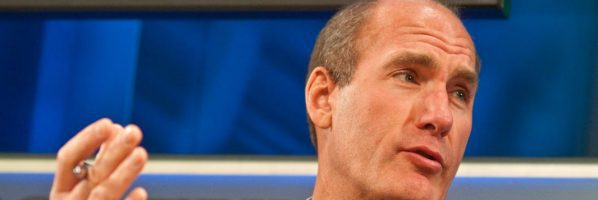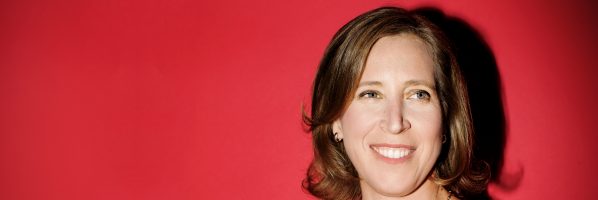John Stankey, the Loyola Marymount and UCLA Alum on Track to Take Over Time Warner

AT&T is awaiting the federal go-ahead for its $85.4 billion acquisition of Time Warner. The acquisition is expected to go through, and if it does, John Stankey, head of AT&T’s entertainment group, will oversee Warner Bros., CNN, and HBO. Though Stankey has no entertainment background, he is confident in his vision for the future these entertainment avenues.
“Over time, investment in content is going to increase,” Stankey said in an interview with The Hollywood Reporter. “My goal would be to find a lane to ramp up investment in content at a higher level than today and to benefit from some of the efficiencies, some of the synergies.”
Stankey received his undergraduate degree from Loyola Marymount University and went on to earn his MBA from UCLA’s Anderson School of Management. Though Stankey has little knowledge of entertainment, he is committed to educating himself by watching more of the shows that are being produced.
There is widespread apprehension regarding AT&T’s plan for its new assets. Optimists foresee AT&T utilizing its consumer data to develop strategies for standing out amidst competing companies. Others fear that AT&T will try to maintain Time Warner’s customer base through discounts, while trying to squeeze out as much revenue as possible.
When asked about what kind of leader Stankey will be, Peter Chernin, the founder and CEO of the Chernin Group, a one of Hollywood’s largest investment firms, said, “I don’t think you’re going to see John trying to green light movies and looking at rough cuts. You’ll see him trying to unlock the opportunity.”
Stankey has indicated that customers may have more original content to look forward to, and that AT&T may use its data to create more tailored advertisements. “We can’t continue to jam advertising down consumers’ throats in 30-minute block,” Stankey said.
The acquisition was announced in October 2016, and, if the buy goes according to plan, AT&T will have officially gained control of Time Warner by the end of 2017.
Researchers at Columbia Business School Address MBA Gender Gap

Over the last few years, top business schools across the world have worked toward gender parity in their MBA programs—with considerable progress. Many MBA programs now admit more than 30 percent women, and a growing number of leading schools top the 40-percent mark. But amid these strides, another problem has emerged: an academic performance gap between male and female students. Recently, researchers at Columbia Business School (CBS) dug into the gender performance gap issue to understand why it happens and how to fix it.
After completing multiple empirical studies, including a survey of MBA students and a review of performance data, the researchers found that both students’ background and their behavior in class have the biggest impact on the gender performance gap. Further, the researchers found that the performance difference was most evident in technically focused classes, such as accounting and finance, and less so in socially oriented courses, such as leadership and marketing.
According to Michael Morris, CBS Leadership Professor and one of the study’s authors, the findings shed “new light” on the gender performance gap at top business schools. “But more importantly, they offer business school leaders directions for policies to effectively redress the grade gap,” he continued in a press release.
The researchers found that one of the main reasons behind the performance gap in technically oriented classes was the students’ background. After examining reported interests in both admissions applications and career counseling inventories, the researchers found that female students are more inclined toward the “poet” interest profile, while male students are more inclined toward the “quant.” For top MBA programs, this means that from the first day of class, male and female students come in with different interests, aptitudes, and experiences that will need to be addressed in order to break gender norms.
Gender norms were also a problem when it came to behavior in the MBA program. Researchers found that female students were typically less assertive, which hindered their learning in technical courses.
“Our research shows that female students far too often hold back and hesitate to ask the kinds of questions that would help them better master technical concepts and procedures, perhaps because it is inconsistent with the established gender norms linking men with technical ability. This has a profound effect on their overall achievement in MBA classes,” said author Aaron Wallen, Executive Director of the Management Division at Columbia’s School of Professional Studies and a former CBS lecturer.
To truly close the gender gap does not simply mean enrolling 50 percent female students, the researchers noted. Instead, top MBA programs also need to do the following three things:
- Sponsor programs that bring in more technically oriented female candidates.
- Conduct outreach to STEM undergraduate programs.
- Reduce required work experience to enroll younger students.
They also recommended including a training program for both faculty and students to teach them the skills for eliciting and managing participation in the classroom and other work settings.
To learn more about the research study—authored by CBS Professors Wallen, Morris, and Jackson G. Lu and INSEAD Professor Beth A. Devine—click here.
This article has been edited and republished with permissions from Clear Admit.
Alumni Spotlight: JPMorgan Vice President Juan Solis, Quinlan MBA

The Loyola University Chicago Quinlan School of Business recently took a look at the life and career of 2008 MBA graduate Juan Solis, the current Vice President of JPMorgan Chase. A short interview touched on a few topics, including why Solis chose Quinlan, and whether he had any advice for current or prospective MBAs. Continue reading…
Georgetown McDonough Announces Two Faculty Appointments

Georgetown’s McDonough School of Business announced two faculty appointment changes recently. Professor of Operations Bardia Kamrad has been appointed as the school’s new Senior Associate Dean for Executive Degree Programs, while Charles Skuba has been named Senior Associate Dean for Executive Custom Programs. Continue reading…
Deciding Which Seattle Marketing MBA Is Right for You

Seattle is, easily, one of America’s fastest growing cities. Just in one year, from 2015 to 2016, the city’s population increased by 21,000 people, according to The Seattle Times. That’s 57 people a day, on average.
It’s no surprise people are flocking to Seattle. Amazon, Nordstrom, and Starbucks have headquarters there—and Amazon has been busy hiring like crazy. Companies like Microsoft and Boeing are only contributing to this growth too. But beyond the economic and population growth, Seattle is beautiful. Famous for its lush mountains, Seattle provides a view of Mount Rainier from just about any point in the city.
Its progressive policies—like providing a $15 minimum wage and legalizing the use and sale of cannabis—also make the city appealing for young people who are curious about where to start their family or career.
It’s the perfect place to build a life—after that MBA you’ve been thinking about. Three programs, in particular, offer competitive marketing MBA programs. Perhaps they’ll land candidates a job in the tech industry where Seattle employees are the “second-best paid techies,” in the U.S, according to The Seattle Times.
Seattle MBA Programs with a Focus in Marketing
Albers School of Business and Economics — Seattle University
The Albers School of Business and Economics dates back to 1976 when the school was renamed to honor the contribution of Eva and George Albers. Since then, it’s garnered a number of accolades. Most recently, The Princeton Review included the school in its 2017 “Best Business Schools” publication. Albers offers different MBA programs, including an Early Career MBA, a Professional MBA, and a Leadership Executive MBA.
The Professional MBA program can be customized to meet a student’s needs. Two thirds of the required 54 credits consist of electives, so candidates can choose the classes they need to meet their career goals. Candidates can make marketing their discipline. The school offers 12 marketing electives. This program allows students to take two of the school’s 10 graduate certificates as part of their electives. Marketing is on that list.
The business school also gives specialized master degrees for accounting, business analytics, and finance. Its Master of Science in Business Analytics (MSBA) can give marketing candidates a competitive edge in learning data skills.
Foster School of Business — University of Washington
The Foster School of Business at the University of Washington has been around for 100 years. Yep, since 1917. In 2007, it took up the Foster name in honor of Michael G. Foster, who donated $36.5 million through his foundation.
This money went toward building the campus’ state-of-the-art facilities, a major perk for a public university. And this devotion the school has for its students has proven successful: Nearly 3,000 alumni have founded companies. U.S. News World & Report ranked its full-time MBA program number one overall in the Northwest and number nine overall among public universities.
The curriculum ensures candidates understand every facet to business: accounting, finance, strategy, and, of course, marketing. But the second year of the full-time program allows students to hone in on their chosen skill. For marketing MBAs, the program offers 12 electives, including one exclusively on data.
Seattle Pacific University School of Business, Government and Economics
The Seattle Pacific University School of Business, Government and Economics started teaching business in 1977. Its Christian background influences the way the school teaches business. Ethics and service are major themes.
The MBA program features seven emphases: cybersecurity, data analytics, finance, human resources management, information systems management, management, and social and sustainable enterprise. Marketing is a required skill in the curriculum. Marketing is included in the pre-MBA courses required to obtain the degree. For advanced courses, marketing analysis is required. The data analytics emphasis is a good place for those interested in marketing to look into. Data is key in marketing. Numbers tell a bigger story than one might imagine.
YouTube CEO and UCLA Anderson Alum Susan Wojcicki Responds to Google Memo

Earlier this month, Google found itself in the midst of controversy after an internal memo from now-former employee James Damore was released to the staff. His out-of-nowhere diatribe claimed, more or less, that women are less biologically capable of being software engineers than their male counterparts. The document, titled “Google’s Ideological Echo Chamber,” was later released to the public, instantly causing scrutiny. Continue reading…
